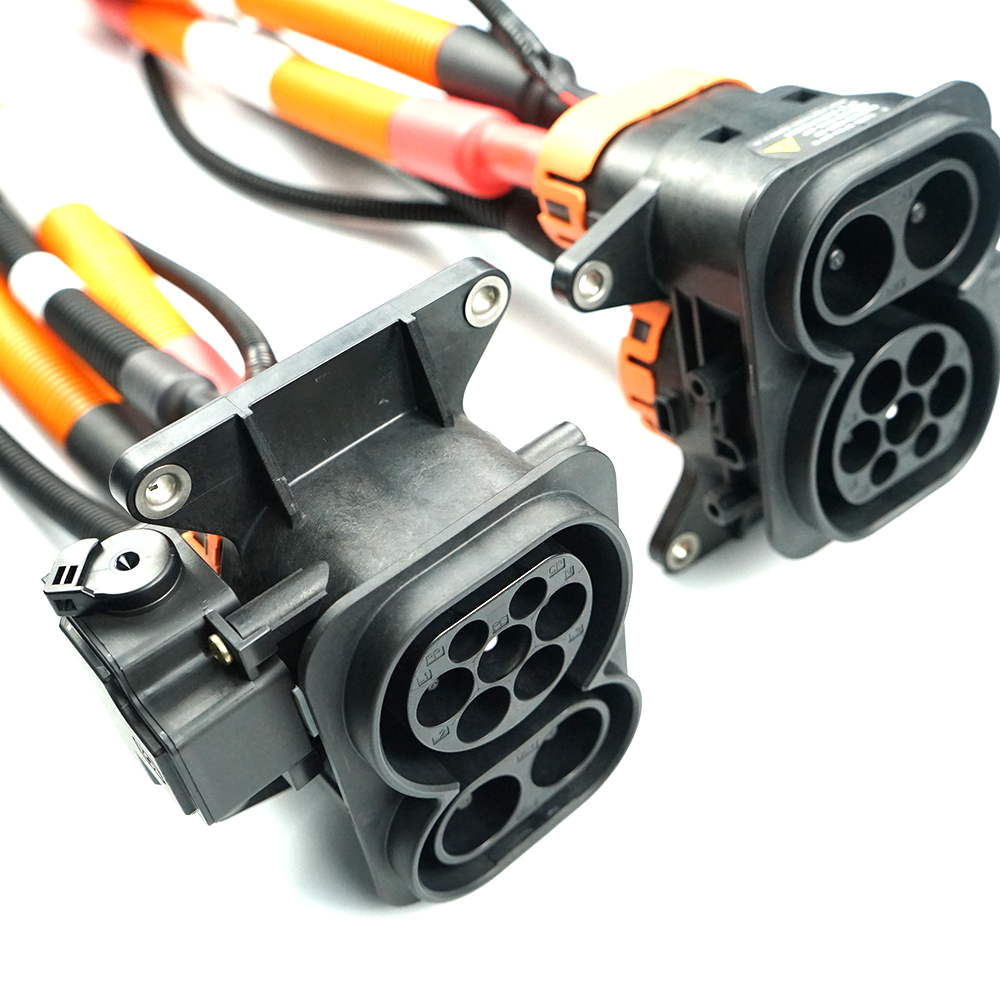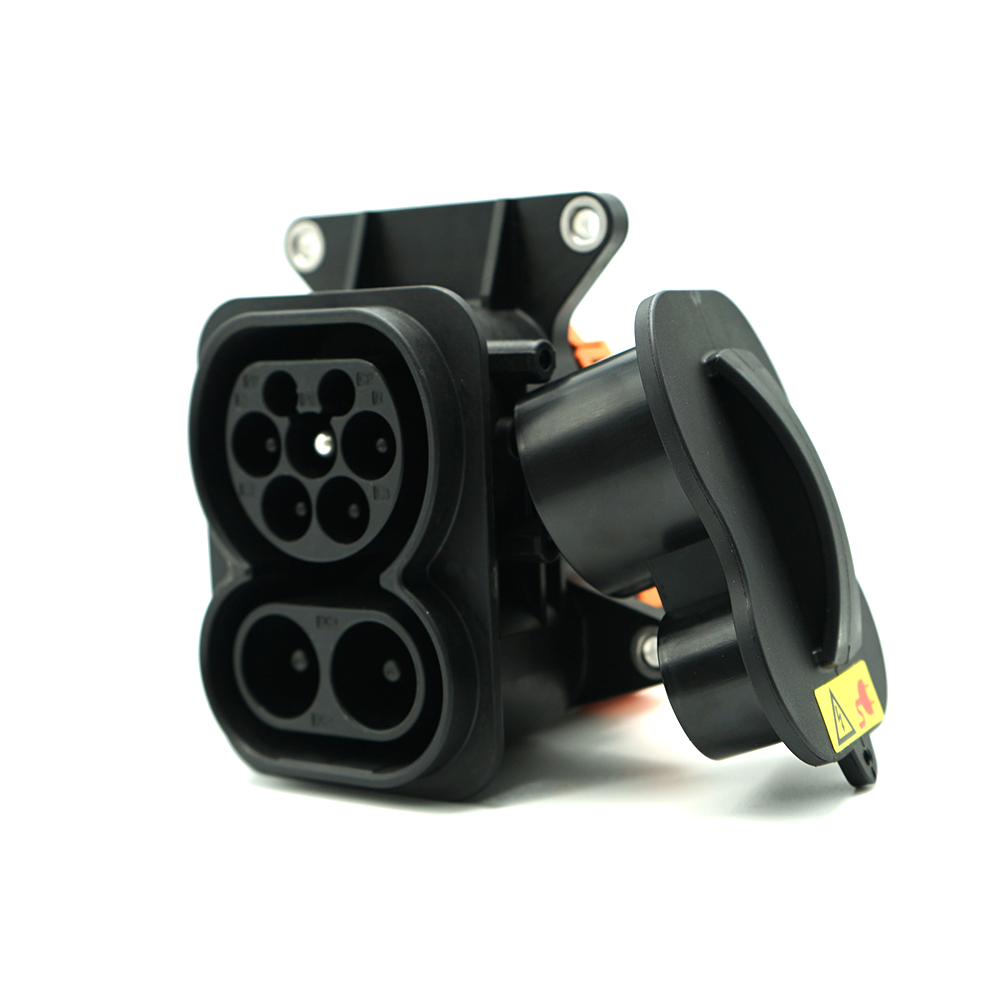Top Quality DC 400A CCS Type 2 Charging Socket for Electric Truck Prototype
CCS2 Charging Standard
The Combined Charging System (CCS) is a fast charging standard for electric vehicles that combines AC and DC charging into a single connector. CCS2 is widely considered the global standard for DC fast charging, and has been adopted by most major automakers in Europe, Australia, South America and South Africa etc..
CCS2 offers two key advantages compared to other charging standards:
- Combines AC and DC charging in one connector: The single CCS2 connector supports both slower Level 2 AC charging up to 22 kW, as well as high-power DC fast charging up to 350 kW. This eliminates the need for separate AC and DC charge ports.
- High power DC fast charging: CCS2 supports charging at up to 400 kW or even higher, allowing an EV battery pack to charge from 10% to 80% in around 15-30 minutes. This enables long distance travel by providing quick charging stops.

Power up Electric Truck with CCS Type 2 Charging Socket
“Our team is currently working on developing an electric truck prototype for the year 2024. We are currently in search of a "Charging Socket" for our prototype. Upon reviewing your products on your website, our team has taken an interest in them.”
Case Study: Prototype Electric Truck
An exciting prototype electric truck currently under development is using the DC 400A CCS Type 2 charging socket. This heavy-duty electric truck is designed for long haul transport and needs to charge quickly during short rest stops.
The engineers selected the CCS2 standard for its high power capacity and wide industry adoption. The DC pins allow for quick charging, while the AC pins provide a fallback charging option.
During prototype testing, Sailtran CCS type 2 socket has performed well in harsh driving conditions and repeated charging cycles. The latching mechanism and rugged housing protect the contacts from vibration, dirt, and weather.
So far, the electric truck successfully meets range targets thanks to its powerful battery pack and fast 300A charging. The CCS2 socket plays a key role by enabling high-speed charging at terminals equipped with CCS2. This electric truck could transform long-haul transportation when put into full production.

Sailtran CCS Type2 Charging Sockets
Sailtran Electronic is a leading manufacturer of electric vehicle HV connectors, including CCS2 female plug, CCS Type2 charging sockets designed specifically for electric cars, trucks and buses etc.. Guchen's CCS Type2 truck charging sockets offer robust performance, safety certifications, and flexible configurations to meet the needs of commercial EV fleets.
Reliability and Safety Certifications
Sailtran's CCS Type2 sockets are engineered to handle repeated daily use in demanding commercial environments. The sockets are independently tested and certified to IEC safety standards, providing peace of mind. Critical components are also subject to rigorous long-term reliability testing.
Flexible Configurations
Sailtran Electronic offers CCS Type2 sockets with current rating from DC 80A to 500A, electronic lock in post-installation and rear installation configurations. Multiple outlet options are available, allowing e-truck manufacturers to select the most preferred connector for easy installation. The sockets can also be supplied with a range of power ratings to match specific electric truck models and use cases.
DC 400A Charging Socket Specs
Some key specifications include:
- Rated current: 400A DC (32A AC)
- Cable cross section: 95mm2, insulation O.D.: Φ17.3±0.3
- Rated voltage: 1000VDC
- Connector standard: CCS Type 2
- Number of pins: 9 pins
- IP rating: IP44 in mated condition
- Operating temp: -30℃ to +40℃
- Electronic lock: 12V, 24V
- Installation: Type A rear installation, Type B post installation
- Temperature sensor: PT1000, NTC 10K
- Compliance: IEC62196-3-2022
Benefits
The CCS Type 2 DC charging socket provides several key benefits for electric truck charging:
- High power delivery & faster charging times
With support for up to 500A charging, this socket enables much faster charging compared to lower amperage alternatives. This helps reduce downtime when charging electric truck fleets.
- CCS standard compatibility
The socket uses the Combined Charging System (CCS) connector type, which is becoming the dominant DC fast charging standard globally. This ensures compatibility with many existing and future charging stations.
- Rugged durability
Electric truck charging ports experience significant wear and tear. This socket is designed to withstand vibration, shocks, and weather elements to provide maximum uptime.
The Future
The future looks bright for advancements in electric truck charging technology. As more manufacturers begin producing electric trucks, there will be greater demand for higher powered DC fast charging stations. This will drive innovation to create chargers that can deliver higher charging power to minimize charging times. We'll also see new EV connector designs that are optimized for high-power charging and can withstand daily heavy use.
The CCS2 female and male connectors are likely to remain the standard, but may evolve to handle greater amperages. Liquid-cooled cables and connectors will help prevent overheating during ultra-fast charging sessions.
Charging networks will expand dramatically to support long-haul electric trucking. Chargers will need to be located at strategic intervals along major highways and transport routes. This infrastructure build-out will be key to enabling widespread adoption.
Battery technology improvements will also allow electric trucks to travel farther between charges. New battery chemistries, cell designs, and advanced cooling systems will increase range and cycle life.
Overall, electric truck charging is poised to improve by leaps and bounds. The next decade will see major progress as manufacturers and charging networks invest heavily to electrify commercial transport. This will reduce operating costs, improve efficiency, and provide environmental benefits over diesel trucks.
